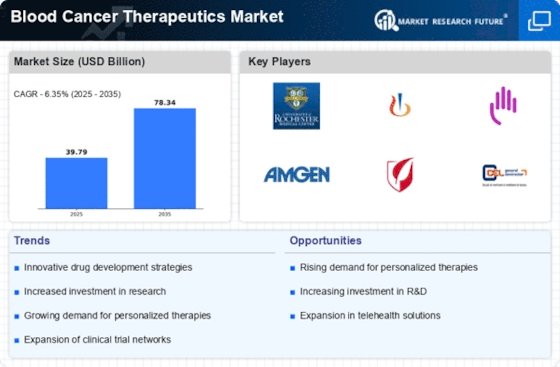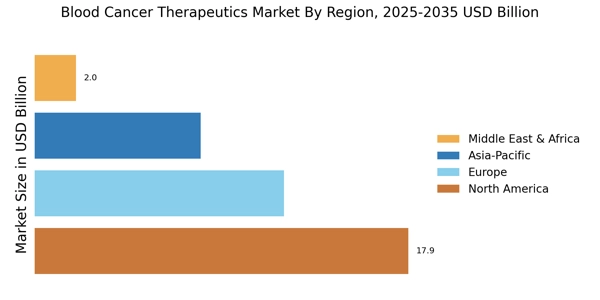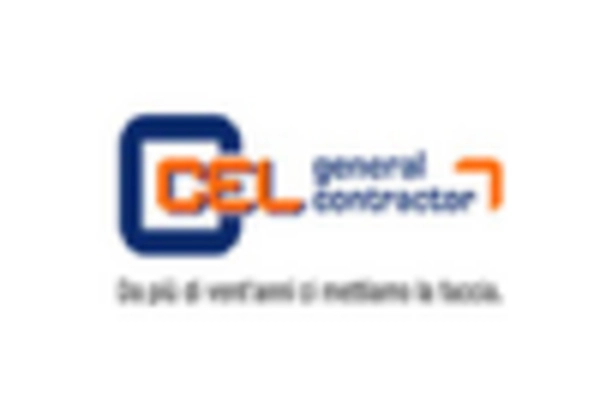Increasing Incidence of Blood Cancers
The rising incidence of blood cancers, including leukemia, lymphoma, and myeloma, is a primary driver of the Blood Cancer Therapeutics Market. According to recent statistics, the prevalence of these malignancies has been steadily increasing, with an estimated 1.3 million new cases diagnosed annually. This surge in cases necessitates the development and availability of effective therapeutic options, thereby propelling market growth. As healthcare systems strive to address this growing burden, investments in research and development are likely to intensify. Pharmaceutical companies are focusing on innovative treatment modalities, which may include novel drug formulations and combination therapies. Consequently, the Blood Cancer Therapeutics Market is expected to expand as stakeholders respond to the urgent need for effective interventions.
Advancements in Research and Development
Ongoing advancements in research and development are significantly influencing the Blood Cancer Therapeutics Market. The emergence of cutting-edge technologies, such as CRISPR gene editing and next-generation sequencing, has opened new avenues for targeted therapies and personalized medicine. These innovations facilitate a deeper understanding of the molecular mechanisms underlying blood cancers, enabling the development of more effective treatments. In recent years, the market has witnessed a surge in clinical trials aimed at evaluating novel therapeutic agents, with over 500 trials currently registered worldwide. This robust pipeline of investigational drugs suggests a promising future for the Blood Cancer Therapeutics Market, as new therapies may soon become available to patients, enhancing treatment outcomes and survival rates.
Growing Demand for Combination Therapies
The increasing demand for combination therapies is reshaping the landscape of the Blood Cancer Therapeutics Market. Clinicians are increasingly recognizing that monotherapy may not be sufficient for optimal patient outcomes, particularly in complex cases of blood cancers. As a result, there is a trend towards integrating multiple therapeutic agents to enhance efficacy and minimize resistance. Recent studies indicate that combination therapies can lead to improved response rates and prolonged survival in patients with various types of blood cancers. This shift in treatment paradigms is prompting pharmaceutical companies to invest in research focused on developing synergistic combinations of existing and novel agents. Consequently, the Blood Cancer Therapeutics Market is likely to experience growth as these innovative treatment strategies gain traction among healthcare providers.
Rising Awareness and Education Initiatives
Rising awareness and education initiatives regarding blood cancers are contributing to the growth of the Blood Cancer Therapeutics Market. Increased public and professional awareness about the signs, symptoms, and treatment options for blood cancers is leading to earlier diagnosis and intervention. Various organizations and healthcare providers are actively engaging in campaigns to educate both patients and healthcare professionals about the importance of timely treatment. This heightened awareness is likely to result in increased patient referrals and demand for therapeutic options. Furthermore, educational initiatives are fostering collaboration among stakeholders, including researchers, clinicians, and pharmaceutical companies, to address unmet needs in the market. As awareness continues to grow, the Blood Cancer Therapeutics Market is expected to benefit from a more informed patient population seeking effective therapies.
Regulatory Support and Accelerated Approvals
Regulatory support and accelerated approval pathways are playing a crucial role in the Blood Cancer Therapeutics Market. Regulatory agencies, such as the FDA, have implemented initiatives to expedite the review process for promising therapies targeting blood cancers. This has resulted in a notable increase in the number of new drug approvals, with several breakthrough therapies receiving expedited status in recent years. The availability of fast-track designations and priority review vouchers encourages pharmaceutical companies to invest in the development of innovative treatments. As a result, the Blood Cancer Therapeutics Market is witnessing a rapid influx of new therapies, which may enhance treatment options for patients and improve overall outcomes. This supportive regulatory environment is likely to foster continued innovation and investment in the sector.


















